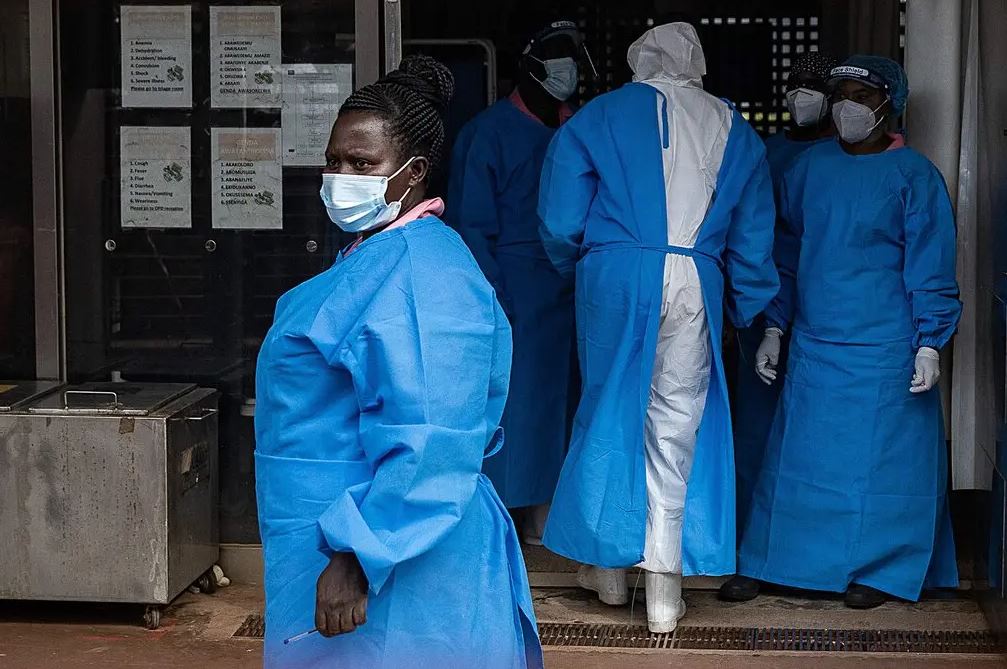Fears are spreading throughout East Africa as a result of an outbreak of Ebola in Uganda that is caused by a strain for which there is neither an approved vaccine nor a drug treatment. Authorities are working quickly to contain the virus, which has already been linked to 35 confirmed infections and seven fatalities.
Scientists and authorities in charge of public health are now working hard to get clinical tests of two experimental vaccines started so that people may be protected against this strain, which first appeared in Sudan in 1976. Even though there are Ebola vaccinations available, they are relatively new and strong, but they do not protect against the Sudan strain. This makes it more difficult to eradicate the illness as rapidly as possible before it overwhelms the poor health care system in the country.
At least six medical personnel have been infected with the virus in central Uganda, which has led some of their colleagues to urge relocation to another region. the instances have been recorded there. Parents are pulling their children out of school out of fear that their kid may get the extremely infectious illness because of their anxiety. And in a country that has been hit by three outbreaks of Ebola since it reported its first case in the year 2000, fears continue that another fast-spreading virus might prompt limitations that would damage an economy that is still recovering from the effects of coronavirus shutdowns.
Ebola is a highly infectious illness that may be passed on by direct contact with sick or dead humans or animals. Symptoms of the sickness include high fever, weakness, diarrhoea, and bleeding both inside and externally. The outbreak of Ebola that occurred in West Africa between 2014 and 2016 was the most deadly in history, claiming the lives of over 11,300 people. The outbreak that occurred in the Democratic Republic of the Congo in 2018 was the second worst, claiming the lives of 2,280 people.
To this point, Ugandan authorities have said that they do not intend to issue stay-at-home orders or curfews, nor do they want to limit mobility in schools, marketplaces, or places of worship.
The most recent outbreak in Uganda was made public on September 20, when health officials announced that they had confirmed a case in a 24-year-old man who had been admitted to a hospital in the Mubende district, which is located approximately 150 kilometres (93 miles) from Kampala, the country’s capital city.
As early as September 11, the patient began exhibiting symptoms, which included a high temperature and bleeding in the eyes, and immediately began making trips to a variety of clinics in an attempt to get treatment. In the end, he was hospitalised and placed in isolation on September 15, but he passed away five days later.
It took longer than expected to detect and track the first human case, and the fact that it was reported in a neighbourhood that was next to an important highway added to the growing worries that the virus may have already spread to major metropolitan centres and nations in the surrounding area. The World Health Organization (WHO) said that the latest epidemic is responsible for at least 18 further fatalities and 19 additional illnesses.
Uganda made the most recent discovery of the Sudan strain of the virus in the year 2012. Infected individuals are unable to pass on the virus until symptoms manifest themselves, which may take anywhere from two to 21 days after the incubation period has passed.
Existing vaccinations, such as the injectable vaccine Ervebo, which has been shown to be effective in combating the Zaire strain in the adjacent Democratic Republic of the Congo, do not protect against the Sudan strain.
According to Mr. Yonas, there are at least six potential vaccines that are now in various stages of research that might potentially protect against the Sudan strain. After undergoing regulatory and ethical evaluations from the Ugandan government, two of these vaccinations could be able to go forward with a clinical study in Uganda within the next few weeks.
Sabin Vaccine Institute, located in Washington, and the University of Oxford are now working on developing two vaccines that have a good chance of being produced. Should this request be granted, the Sabin vaccine given in a single dosage would very certainly be the first candidate tested. The World Health Organization (WHO) has said that it would collaborate with an independent group of vaccine specialists to assist in evaluating the remaining vaccine candidates when new data arises about their appropriateness.
For the time being, health authorities and a variety of nonprofit groups are working together to react to the crisis by providing training for medical staff, constructing new isolation units, and allowing the establishment of more testing facilities.
More than four hundred persons who had come into touch with contaminated individuals have also been located and identified. According to the World Health Organization, two patients were also released from the hospital late on Friday.
According to Oluma Jacob, a health adviser with Medical Teams International, an aid group that is responding to the outbreak, officials have also begun multiple outreach campaigns to educate the public on how to protect themselves, not stigmatise the infected, and report those showing symptoms. These campaigns aim to educate the public on how to protect themselves, not stigmatise the infected, and report those showing symptoms.
His concerns were shared by frontline health workers, who said that the absence of sufficient pay and security was putting their lives in danger, especially for medical interns. According to Mr. Museveni, among the six people working in the medical field who were infected with the virus were four physicians, an anesthesiologist, and a medical student. On Saturday, Uganda’s Minister of Health said that one of the country’s physicians had passed away.

